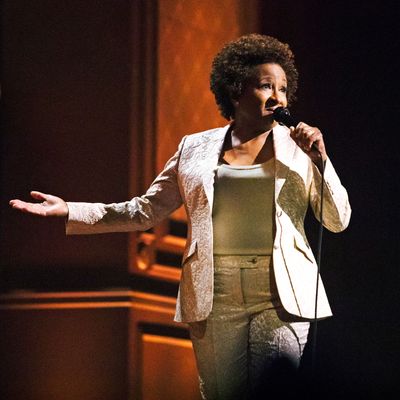
The opening line of Wanda SykesÔÇÖs new Netflix special is, ÔÇ£Let me just start by saying: If you voted for Trump, and you came to see me?ÔÇØ She pauses, shaking her head while the audience whoops in appreciation, and then she continues, ÔÇ£You fucked up again.ÔÇØ The idea of that joke is Trump, yes, but itÔÇÖs mostly about confirming and promising that Sykes and the audience are all on the same page. She feels no need to pretend that she is something sheÔÇÖs not, no need to couch her material as though her viewpoints or many of her subjects are going to be a surprise. She is Wanda Sykes, and this is 2019, and sheÔÇÖs about to do a set on Trump, race, feminism, her family, and her body. Anyone whoÔÇÖs not here for that should see themselves out.
Sykes is good at the Trump material, adeptly conjuring his physicality by stiffening her hands and slouching her shoulders, pointing out some of his many absurdities, cleanly cutting into the strangeness and surreality of right now. She clearly cares about skewering the Trump administration and the awfulness of current events ÔÇö itÔÇÖs where the title of the show comes from, itÔÇÖs what she leads with, and it takes up the bulk of the opening of the set. And she has a few jokes on Trump that feel like illuminating, clear-eyed ways of attacking the material. ThereÔÇÖs one bit about the Mueller report and ÔÇ£Individual-1ÔÇØ where Sykes points out that if any of this were about herpes rather than criminal collusion, no one would pause at all in identifying exactly where the herpes was coming from. The joke is simple and obvious and does its job well, smacking you right in the face with the idea.
Much of the Trump stuff dances around on superficials, though. Ideally, an image like a bunch of military servicepeople saluting Trump while refusing to comment on the fact that he has toilet paper stuck to his shoe would be funny all on its own, while also being tethered to some other idea or story. SykesÔÇÖs image is funny, but the tether is more tenuous. SykesÔÇÖs jokes tend to focus on the simple buffoonery of it all, but in part because they largely deal with surface things; they also arenÔÇÖt that effective at tying the material down to some more revelatory point. ItÔÇÖs funny, in other words, but itÔÇÖs not particularly deep.
Her joke about how no one should watch The Bachelor feels similar. The craft of it is strong, and she does a bit with the mic as a dangling dick that slides into pure silliness. But like several of the Trump jokes, itÔÇÖs mostly superficial ÔÇö neither a particularly sharp reading of the franchise or a newly biting critique of its viewers.
SykesÔÇÖs work is much stronger when she turns to the reality show Naked and Afraid. The Bachelor joke relies mostly on making fun of the women who agree to be on it and the viewers who watch it, but on Naked and Afraid, Sykes goes after the producers who make it. Her primary joke is about a contestant named Ronald, one of the few black contestants sheÔÇÖs seen on the show, whoÔÇÖs also doing remarkably well in the challenge. Then, Sykes explains why: Ronald is homeless. ItÔÇÖs a joke about the inherent assumptions of Naked and Afraid, and how the setup for the show looks very different depending on the circumstances of the contestant, but itÔÇÖs mostly a joke about the makeup of the production staff. There cannot have been a black person involved in that casting choice, Sykes says, exasperated. Any black person wouldÔÇÖve instantly pointed out how messed up it is to cast a homeless person. ItÔÇÖs the kind of observation that gives SykesÔÇÖs otherwise highly skilled goofing a little more oomph. It slices deeper.
Her best joke comes about 40 minutes in, as she shifts out of material thatÔÇÖs about race in America and into a sequence about race within her own family, including herself, her French wife, and their white children. ÔÇ£IÔÇÖm learning things from my family,ÔÇØ Sykes says. ÔÇ£Like, IÔÇÖm learning how to play.ÔÇØ She pauses, raising her eyebrows and dropping her face into a look of skeptical disdain. ÔÇ£Because black people donÔÇÖt play.ÔÇØ She extends the joke, pulling it through an anecdote about her son bopping her in the face with a balloon and her exasperated, disbelieving, mom-who-thinks-sheÔÇÖs-being-disrespected response. ÔÇ£Are you playing with me? DonÔÇÖt you play with me now!ÔÇØ Then she pauses and looks at her white son, whoÔÇÖs just kicking around some balloons. ÔÇ£Oh. YouÔÇÖre playing.ÔÇØ He is a kid, playing with a toy.
Sykes, in that moment, shifts in and out of identities and vernaculars, spinning hilariously on the word play as she balances competing, conflicting expectations and experiences. She is a black mother disciplining her son for what she assumes is bad behavior; she is looking at her white son and being chided by her white wife for not just playing with him, because he is a kid whoÔÇÖs being playful. ItÔÇÖs a lovely joke, tying together both SykesÔÇÖs inclination for physical performance and her adeptness at unpacking ideas of blackness versus whiteness.
As a whole, the special would be stronger if there were more sequences with that kind of multilayered thoughtfulness. But Not Normal has plenty of moments that stand out on their own, more than justifying the few bits that feel a little thin. Sykes, especially when she moves to the personal, is in peak form.


